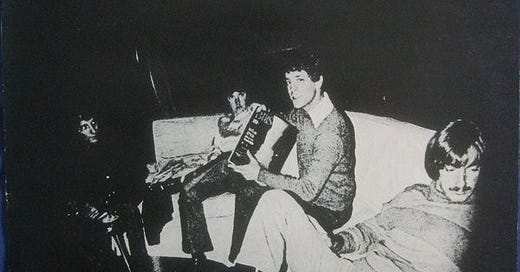I wish it could happen to me
The Velvet Underground - 'After Hours' (The Velvet Underground - 1969)
‘After Hours’, the closing track on The Velvet Underground's self-titled third album, does an effective job of closing out the record, but while it doesn’t point in the direction that the band would head to before imploding at the start of the 1970s, but instead with its simplicity and emotional depth the song it is a well that others have been to many times over the last three decades and cast their pail to fetch up more water. It certainly is a departure from the band's earlier, more experimental work, and unlike their two previous offerings to close their records, it encapsulates a moment of quiet reflection and turns the dial of intensity up rather than down.
‘After Hours’ was written by Lou Reed but sung by drummer Maureen Tucker; it is tough to imagine Reed singing it; to be honest, Reed rightly believed that the song was "so innocent and pure" that it demanded a voice that could convey its delicate nature, and Tucker’s childlike vocals fit perfectly by imbuing it with a child’s sense of wonder that would not work with Reed or even Nico deadpanning them.
The recording features Tucker’s vocals accompanied by acoustic and bass guitar, creating a minimalist arrangement that harkens back to the Tin Pan Alley songs of the 1930s. This baseline level of simplicity highlights the loneliness and longing that can be read from the lyrics on the page but comes across even more from the vocal. Reed’s decision to give Tucker the lead was rooted in his recognition of her ability to bring an unpretentious, heartfelt quality to the song.
This was her first spot as a lead singer, a role she approached with a mix of excitement and nervousness.
I like the song, I like the words. I was just very nervous recording it. I tried it about eight times. Finally, I made everyone else leave. It was just me, Lou and the engineer and I finally did it okay. But I told them “I’m not singing this live unless someone requests it.” Because I was scared stiff. Then some creep requested it in Texas. So that was my singing debut on stage1.
The lyrics describe a timid person observing others having fun and wishing they could join in, evoking a yearning to escape reality’s harshness into a comforting, perpetual night. Tucker’s tender delivery makes the chorus feel almost like a lullaby, though the lyrics speak to a deep sense of solitude.
Reed has said that;
You still don’t hear that kind of purity in vocals. It has nothing to do with singing. It has everything to do with being. It’s completely honest. Guileless. And always was. I couldn’t sing that song. Maureen could sing it, and believe it, and feel much more. Because it’s about loneliness. “Someday I know someone will look into my eyes” – it can be so sappy and trite. But with Maureen doing it, especially being just a little off key, it has its own strength and beauty to it.
The song’s arrangement is simple and sparse yet effective. The acoustic guitar strumming and gentle bass provide a soft bed for Tucker’s vocals. At the same time, the lack of additional instrumentation allows the listener to focus on the purity of her singing.
‘After Hours’ differs from other VU closers, but judging it against the other songs on the band’s third album, it marked a shift towards a more melodic and accessible sound. The album’s overall production, led by Reed and featuring the band’s evolving line-up, showcased a relatively more polished approach than their earlier, rawer records. Even with those calmer waters, having it close out the record allows it to slip out with a slight flourish.
Over the years, ‘After Hours’ has become a beloved song for its sincerity and simplicity. Its influence can be seen in the work of numerous indie and twee-pop acts from the 2000s, who embraced similar themes of vulnerability and emotional honesty, as told by an earnest and yearning soft vocal. Bands like Belle and Sebastian, Camera Obscura or Slow Club have echoed the song’s gentle, introspective style in their music, creating a lineage of artists who value the same kind of unadorned storytelling that ‘After Hours’ and could fill three volumes of the Juno OST. Now, ‘After Hours’ doesn’t feature in Juno, but both songs have the same vibe and a similar influence down the years - which you can also hear at the end of the film with Page and Cera covering The Moldy Peaches’s ‘Anyone Else But You’.
Furthermore, the song’s tone and Tucker’s vocal delivery parallel the ethos of the acoustic covers often used in John Lewis Christmas adverts. These adverts are known for their vibrant simplicity and nostalgic appeal. They typically feature soft, heartfelt renditions of well-known songs that evoke a similar sense of intimacy and warmth in the same way that ‘After Hours’ does with such simplicity and emotional honesty.
The above video is not from a Texas show but from gigs at The Matrix, San Francisco.




